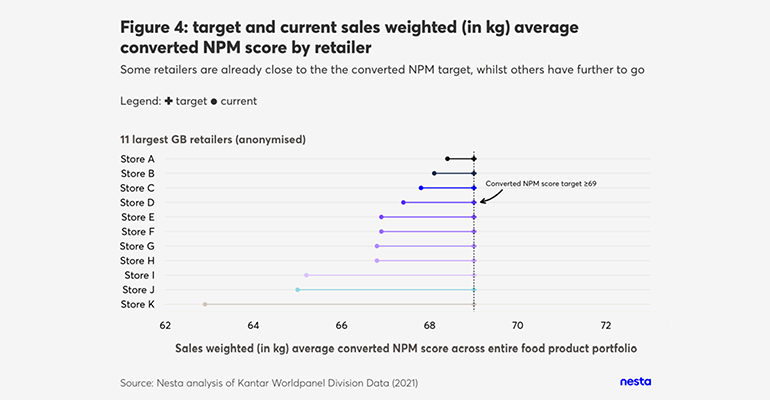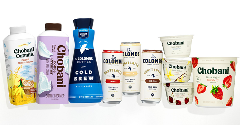News
Retailers must do more to promote healthy eating
12 Apr 2024UK retailers could play an even bigger role in helping consumers to make healthier food choices, according to Nesta, an innovation agency targeting social good.
Nesta is a non-profit organisation that – in its own words – “designs, tests and scales new solutions to society’s biggest problems, changing millions of lives for the better”. It brings together a range of experts and thinkers to address the defining issues facing the UK, from tax and economic growth to health and education.

Hugo Harper, Nesta’s mission director, recently penned a blog article, suggesting that the approach to food and health in the UK has been misguided, contributing significantly to the steep rise in obesity and associated health problems since the 90s.
Pivotal to this problem is the fact that the food that is readily available and affordable has changed, getting progressively unhealthier, and that UK supermarkets are playing a role in this, Harper believes.
How retailers and Government can play their part
Nesta conducted research (detailed in the company’s policy brief), which looked at 11 different grocery retailers across the UK. It found that while some chains are already close to the desired nutrient profile model (NPM) required to help consumers make healthier choices, many of the chains still have a long way to go to meet basic requirements.
Ingredients Network asked Nesta how supermarkets could be expected to step up to the challenge of reversing the trend towards unhealthy foods and what role the government might play to help solidify these efforts.
Lauren Bowes Byatt, Nesta’s deputy director of healthy life, said: “Some supermarkets will have further to go than others - although nine of the 11 supermarkets are already within two points of the target. Ultimately the businesses that are far away from their healthier competitors do have a role to play in shifting their offer for their customers.”
 Pictured: Nesta Analysis of Kantar Workpanel Division Data 2021 | © Nesta
Pictured: Nesta Analysis of Kantar Workpanel Division Data 2021 | © Nesta
Giving consumers greater flexibility and value
On the back of its research, Nesta is recommending the introduction of initiatives such as two-for-one offers or discounting for healthier grocery items, to encourage the purchase of more nutritional foods, while simultaneously helping consumers to manage their household budgets.
“By setting a target for all big food retailers, they should pull in the same direction. It sets an industry wide goal but gives each supermarket the flexibility to choose their own tactics in order to meet the target, while keeping down the cost of a basket of food,” said Bowes Byatt.
“The tactics could include changing store and online layouts to avoid pushing less healthy products – such as those high in sugar – on consumers, purchasing and stocking a wider range of affordable healthy food, and using advertising and promotions like buy one get one free to make healthier items more affordable for families.”
While there is still room for several UK grocery retailers to do more to help in the push towards improving the health outcomes of consumers by encouraging them to buy more nutritional foods, the research also points to the fact that the government needs to play its part to help improve outcomes.
How Government can back up grocery retailers
Nesta research points to the fact that while grocery retailers are already on track to help improve the situation, the UK government needs to do its part to lend even greater gravitas to these efforts.
“…we believe that these health targets should be mandatory to encourage all retailers to act and create a level playing field. Our implementation plan provides government with a clear roadmap of how to put this proposal into practice,” said Bowes Byatt. “We propose that primary legislation is used, the Department of Health and Social Care oversees the design of the policy and the Food Standards Agency holds the powers to enforce compliance with targets and impose penalties, such as ones based on a percentage of annual turnover.”
Nesta says it is presently conducting further research into the NPM data it holds for UK food retailers and will soon by publishing more detailed information that will include the differences it found across different regions in the country, as well as income groups.
Related news

Portugal officially adopts NutriScore
10 Apr 2024
Portugal has adopted the NutriScore as its official – but voluntary – front-of-pack nutrition label to promote healthy eating, with researchers calling this “a great victory for science and public health”.
Read more
KoRo’s limited edition pistachio-packed waffle delivers balanced indulgence
26 Mar 2024
Natural food brand KoRo’s special edition vegan waffle crafted with 45% pistachios, stands as a healthy yet indulgent snack, embracing the nutritious appeal of nuts.
Read more
Ultra-processed food intake in South Africa at concerning levels, study suggests
19 Mar 2024
As South Africa considers introducing front-of-pack warning labels and strict marketing limits for unhealthy foods, research has found that low-income South Africans get around half of their calories from ultra-processed foods (UPFs) – “a cause for con...
Read more
India’s mithai market develops new ingredient and flavour profiles
18 Mar 2024
Mithai is a hugely popular dessert and sweet snack in India and manufacturers are experimenting with unique ingredients, new flavour combinations, and healthier versions to capture new audiences.
Read more
Brazilian manufacturers must comply with warning label regulation, says court
7 Mar 2024
The Federal Court of São Paulo has ruled that Brazilian manufacturers must comply with front-of-pack labelling regulation that requires unhealthy products to feature warning labels, scrapping a last-minute one-year extension.
Read more
Macauba oil emerges as potential rainforest-friendly palm oil alternative
1 Mar 2024
Producers and researchers consider the rainforest-friendly credentials of Macauba palm oil and whether its sustainability credentials offer an opportunity to replace palm oil.
Read more
Reviving childhood favourites: Healthier twists on classic snacks
20 Feb 2024
Consumers are increasingly leaning on brands for comfort and familiarity - a trend US-based brand Justin’s is tapping into. With its recent launch of Chocolate Candy Pieces, Justin’s is drawing on nostalgic marketing trends, while incorporating better-...
Read more
Is it useful to classify foods as ultra-processed?
26 Jan 2024
The term ‘ultra-processed’ is gaining traction – and notoriety. But does it help consumers make healthier food choices or encourage manufacturers to make their ultra-processed products healthier? Food industry stakeholders explored the term’s usefulnes...
Read more
Chobani expands drink presence with La Colombe acquisition
16 Jan 2024
Greek yoghurt giant Chobani has purchased US coffee brand La Colombe Coffee Roasters for $900 million, furthering its expansion into beverage categories like coffee, oat milk, creamer and ready-to-drink offerings.
Read more
‘Healthy’ additives make ultra-processed foods more appealing
4 Jan 2024
Almost three-quarters (74%) of Americans would try an ultra-processed food if it provided a health benefit such as better sleep, better immunity, or increased energy, according to an industry survey.
Read more